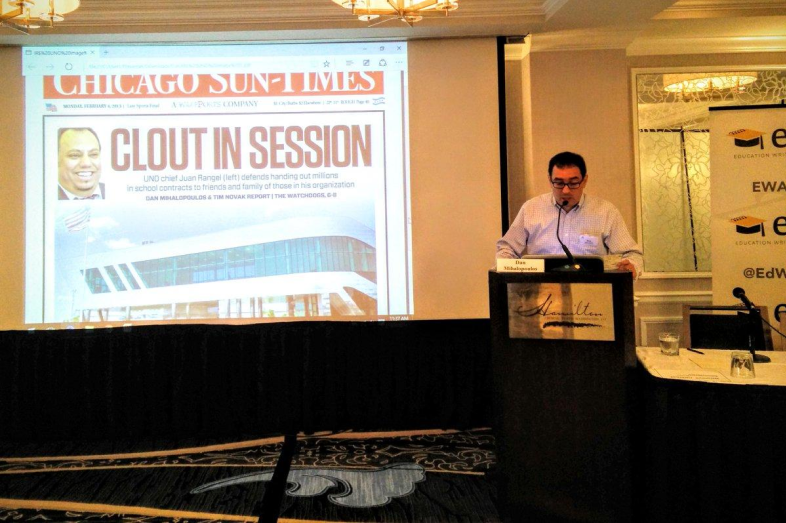

Charter schools have grown at a rapid rate over the past 20 years as parents, activist groups, lawmakers and others look for alternatives to the traditional public schools.
Supporters say charters can offer the freedom to be more creative in the curriculum they provide to support a wider range of needs for students.
But while many charter schools have succeeded, leading to improved student achievement, especially for minority groups who often struggle academically, many other charter schools have been plagued by mismanagement and corruption, especially when it comes to their finances.
Dan Mihalopoulos, an investigative reporter for the Chicago Sun-Times, spoke at the Education Writers Association’s recent Washington, D.C. seminar, Equity in Education: What That Means for Latino Students, about his experiences reporting about a Chicago charter schools group.
Charters schools can be started by just about anyone, such as parents or teachers, to offer specialty programs. The schools are run independently and receive the same amount per student as other public schools. Many large cities, including New Orleans, Los Angeles, and D.C. have a high concentration of minority students attending charter schools. In Chicago, for example, 1 in 5 students attend a charter school.
Mihalopoulos’ 2013 stories about the United Neighborhood Organization’s charter-school network won EWA’s first prize for investigative reporting, as well as a host of other awards.
Through his investigations, Mihalopoulos found that the charter network, also known as UNO, awarded millions of dollars of construction contracts to companies owned by various brothers of the network’s chief operating officer, Juan Rangel.
During his presentation in Spanish at the EWA seminar, Mihalopoulos described to journalists from Spanish-language media outlets across the country how he uncovered the story and what steps he took to report on the issue.
“Investigating a charter school is very similar to investigating a public school,” he told the audience.
Mihalopoulos said the best place to start was by following the old investigative journalistic adage of “following the money.” He offered a series of tips for how to track spending, the awarding of contracts and political donations. They include:
- Freedom of Information Act requests
Because charter schools are public schools, they are required to follow public records requests across most states. Like school districts, they’re required to respond within a few days and provide copies for contracts and payments to vendors. - Agreements between charter school authorizers and the charters
Charters are run independently, but public school districts where the charters operate must sponsor and oversee finances of the charter schools. Districts have to maintain records of finances, and other records including school expulsions, ethics codes, and the practices for admitting students. - State and federal grants
All charter schools have the right to solicit and receive many of the same state and federal grants available to traditional public schools. When the state of Illinois awarded a $98 million grant to UNO charters to build new schools, it was considered the largest subsidy ever awarded to a charter group for new construction.
The state required that UNO provide receipts for all spending as part of this grant, but state officials never reviewed these receipts. But Mihalopoulos and his team did look at these receipts after they attained them through a public records request. That’s where he found that many of the contractors included brothers of UNO’s high-level executive. Under an agreement with the state, UNO was required to report any payments made to contractors that might be a conflict of interest, which UNO never did. - Sale of bonds
Many charter schools receive millions of dollars thanks to the sale of bonds. Records of bond sales from charter schools are archived at the Municipal Securities Rulemaking Board at emma.msrb.org. - Form 990
Charter schools are generally recognized as nonprofit organizations and therefore are subject to the federal 501(c)3 provision. The law requires these entities file annually a federal 990 form to the IRS. These 990 forms are archived by the IRS and can be accessed for free through guidestar.org. These forms contain salaries of the highest paid executives in organizations. - Political donations
Federal law does not allow political donations from nonprofits groups, but some executives and directors of charter schools offer personal donations to candidates. In the case of UNO, many of the contractors made donations to candidates that UNO leaders backed. Additionally, many UNO employees volunteered to gather signatures to get UNO-backed candidates on the ballots.
Mihalopoulos also advised that private firms now own many charter school networks, which is allowed under the law. But the schools themselves, because they are public schools, are still subject to freedom of information requests, even if the firms’ executives might try to challenge this notion.
Mihalopoulos warned the audience at the EWA session that as newsrooms shrink and the number of newspapers decreases, it’s now more much more difficult to cover the types of stories such as the UNO charter network. But that should not stop journalists from being aggressive.
“The pressure is on all of us,” he said. “We’re all being asked to do more work for less pay. But we need to continue to push as hard as we can.”